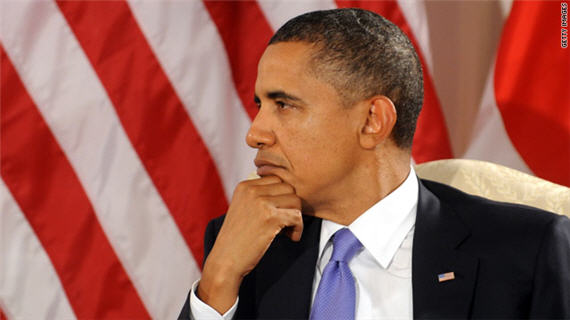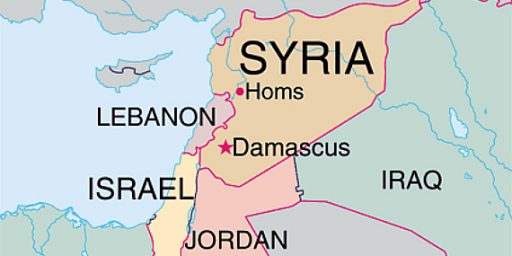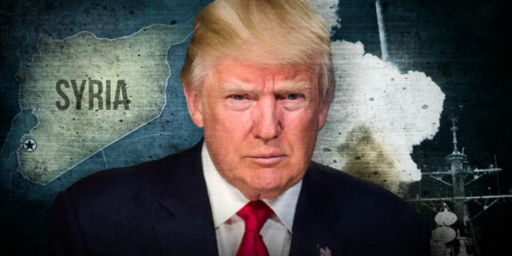Was Obama’s Syrian “Red Line” A Mistake?
President Obama may regret drawing a line in the sand over Syrian chemical weapons.
With the announcement yesterday that the United States had apparently confirmed the use of a small amount of chemical weapons, presumably by Syrian Government forces, those who have been advocating for greater American intervention in the Syrian civil war for some time now have been upping their efforts to pressure the Obama Administration to act. John McCain is renewing his calls for military aid to the Syrian rebels and the establishment of a no-fly zone over Syria, for example, and he’s being joined by legislators like Sen. Lindsey Graham and House Intelligence Committee Mike Rogers both of whom are saying that the news, albeit unverified, means that the Administration has to act. Meanwhile, in the blogosphere, Jeffrey Goldberg seems to see the news as a hopeful sign that we’ll see U.S. military action in Syria at some point in the near future:
If you recall, President Barack Obama drew a “red line” for you: no use of chemical weapons in your brutal attempt to put down the uprising against your regime. Any use of such weapons (even any “moving around” of such weapons) would “change my calculus,” Obama said, “change my equation.” In other words, welcome to the day in which the calculus might just be changing.
Hagel, speaking to reporters in Abu Dhabi, said that U.S. intelligence has come to believe — like the Israelis, the French and the British before them – that President Bashar al- Assad’s regime seems to have used sarin “on a small scale.”
(…)
Obama has some choices to make. He could use force to begin destroying or safeguarding Syria’s chemical weapons stockpiles. This is dangerous, of course, and could even involve the insertion of U.S. special operations forces trained in such work. Obama’s other options include establishing no-fly zones and openly arming Syria’s rebels, steps that could lead to the quicker collapse of the regime. No-fly zones are expensive and hazardous to maintain, but they would go a long way toward degrading Assad’s power. Arming the rebels is similarly fraught, because many of them are the sorts of people who seem likely to one day turn these weapons back on the U.S. or its friends.
There are no good choices — good outcomes in Syria are impossible to imagine. But if it is proved to a certainty that Assad is trying to kill his people with chemical weapons, then Obama may have no choice but to act, not only because he has put the country’s credibility on the line (Iran and North Korea are undoubtedly watching closely), but also because the alternative — allowing human beings to be murdered by a monstrous regime using the world’s most devilish weapons, when he has the power to stop it — is not a moral option for a moral man.
Jonathan Tobin made similar comments over at Commentary:
More to the point, this is a moment when the United States must reassert its responsibility to stop humanitarian disasters. While many, if not most, Americans don’t care whether Assad or some other thug rules Syria, the notion of the West standing back and watching while mass murder is taking place is unacceptable. Having already said that the use of chemical weapons is a “red line” Assad cannot cross without triggering Western action, the president cannot continue to stay on the sidelines.
For too long, President Obama’s Syria policy has been one of “leading from behind” and hoping that the problem will be solved before we are forced to do anything. But Assad won’t be toppled without Western involvement. Nor will we be able to keep his chemical weapons out of the hands of extremists by praying that others will do the job for us.
Tobin’s co-blogger Max Boot largely agrees with him as does, unsurprisingly, The Washington Post’s Jennifer Rubin:
[W]hat should the administration do? A half-hearted gesture (e.g., increasing humanitarian aid to the rebels) is not commensurate with the atrocity or with the president’s warning. If the president wants to change the calculus, just as chemical weapons changed the Syrian war, he will need to change U.S. policy. That may entail providing lethal aid to non-jihadist elements in the opposition, setting up a no-fly zone to protect civilians, and upping diplomatic and economic sanctions against Syria.
The president’s foreign policy has to date consisted of wishful thinking (a world without nukes!); pummeling our friends (Israel); trying to engage dictators in China, Iran, Syria and elsewhere; and deferring to international bodies. These factors, plus a determination not to engage our enemies and instead avoid and withdraw from conflict without settling the underlying security situation (in Iraq, Afghanistan), have undercut our credibility. The president has a chance to recover lost ground, or he can make diplomatic noise, change the amount (but not type) of our aid and take no other steps to bring an end to the bloodbath. If so, he’ll be signaling to Tehran and Pyongyang that an Obama ultimatum means nothing.
As a preliminary matter, I find the comparisons that Rubin, Tobin, and others are trying to make between Syria and possible future actions by Iran or North Korea to be a bit of a stretch. With regard to North Korea, we are bound by defense treaties to the protection of both South Korea and Japan. With regard to Iran, while we lack a formal treaty with Israel, the fact of the matter is that our relationship is close enough to be a de facto alliance to the point where if Iran did begin making serious threats that threatened the security of Israel and the rest of the Middle East, the United States would be compelled to act. The situation in Syria is far more complicated. For one thing, we cannot even be sure whether the anti-government side is, in the end, any better than the Assad regime itself. Indeed, it’s pretty well known that elements of the rebel forces fighting in Syria now are linked to al Qaeda and similar jihadist groups such as Hezbollah. For that reason alone, it seems foolish to me to be enthusiastically back a rebellion in a nation that is centrally located in the Middle East, and which could have an impact on the political futures of Lebanon, Israel, Jordan, Iraq, and Turkey to name just five of its neighbors. We went into Iraq without any clear idea of what the post-Saddam picture would look like in Iraq and no real plan to handle it when it came into existence, do we really want to do that again in Syria and risk destabilizing more of the Middle East?
Additionally, I’ve got to wonder why it ought to be the case that what all reports indicate was a limited use of chemical weapons should necessarily mandate a change in American policy in Syria. This war has been going on for more than two years now. Hundreds of thousands, if not millions, of people have been made refugees because of the fighting. Up to 70,000 people have died. Throughout it all, neither the United States nor the rest of the West has shown any inclination to step into the conflict except in the most limited of ways. Why should that change now? Some will cite the long-standing, since the end of World War One, international norms that have been created against the use of chemical weapons, but if we’re talking about a small scale attack does that mean that we must treat it is as if it were a mass attack on the level of what Saddam Hussein did to the Kurds in the 1980s? This isn’t to excuse the use of chemical weapons, of course, but I’m not sure that their use under these circumstances makes further U.S. involvement in a complicated civil war any less of a bad idea than it was the day before yesterday. Surely, there is a way to respond to this incident that doesn’t involve further U.S. involvement and/or actions that hasten the collapse of the regime in Damascus. Especially since, as Daniel Larison notes, a collapsed Assad regime would make it more likely that those chemical weapons could fall into the hands of terrorists or rogue regimes.
President Obama’s problem now, of course, is the fact that he’s painted himself into a corner to some extent. By saying that any use of chemical weapons by the Syrians was a “red line,” he created the impression that the U.S. would not tolerate even a single chemical shell being fired. The “red line” was vague enough, though, that it was unclear exactly what the United States would do if the line was crossed,or even what kind of an act constituted crossing the line. Now that the Syrians have apparently engaged in the limited use of chemical weapons, the world expects the United States to do something and President Obama’s domestic opponents stand ready to pounce if they perceive that he’s backing down from the threat. Unfortunately for the President, backing down may be the smartest thing to do under the circumstances. For that reason, he may come to realize that drawing a “red line” over the use of chemical weapons wasn’t really a good idea after all.






“No” is usually the right answer to a headline question. US policy has always considered the use of chemical, bio and nuclear weapons as a no go-zone.
It never works out well when the bully steps across your line in the sand and you respond by drawing a new line ….
@Anderson:
1. What should the U.S. do now that the line has been crossed?
2. What do you think the consequences are of the U.S. not doing something?
3. Are the consequences of not doing what you recommend worse than the consequences of doing nothing?
It appears there is disagreement.
Was it a mistake? It depends on whether or not Obama really wanted a reason/excuse to get involved in Syria. The longer this civil war drags on, the more the chance of someone – probably Assad – using chem weapons approaches certainty. Threatening to do this practically guaranteed being pulled in sooner or later…
Spartacus (you *are* Spartacus, right?), my point is, don’t draw lines. Certainly not publicly. A quiet, deniable word between diplomats suffices.
When President Obama drew a red line I doubt he meant he was going to send troops overnight or go on a bombing mission the minute after he said it! It’s all too easy for armchair critics to say should he said this or should he have said that, they are not the ones getting all the up to mintue details so the president can decide on how to proceed. John McCain and his buddy Lindsay Graham would have every member of every service over there already! Never seen any war they don’t like to be involved in!!
In the end, Doug, the US will have to be concerned with Syria precisely because its smack dab in the middle of the Middle East and what happens will affect the political futures of its neighbours. It was naive to think we could NOT be involved.
What matters is the timing and nature of the involvement. As the crossing of the red line, it depends on how you define “crossing of the red line”. Obama could say, plausibly, that what he had in mind was not scattered use of chemical weapons in ambigious circumstances but mass use of chemical weapons against civilians, a la Saddam’s gassing of the Kurds. If that’s Obama’s definition of use of chemical weapons, then the red line hasn’t been crossed.
Even if Assad crosses that line, the next step isn’t the sending in of the 82nd Airborne. As Bosnia, Serbia, and Libya shows, air war in support of native ground forces may be enough to do the job( maybe with Special Forces help).
As to who will rule Syria, one way to assure that the jihadists will triumph is not to help the moderates. (See the Soviet-Afghan conflict). Sitting on your hands and hoping things will turn out right never works in the Middle East.Note that in the Libyan conflict, the western allies intervened strongly on behalf of a mixed bag of rebel forces and moderates did come out on top. Now you and Dave have complained that things aren’t rainbows and unicorns in Libya. But it would have been a hell of a lot worse if a jihadist regime had taken power in Libya.Western intervention forestalled that.
In the end, all interventions don’t have to be Iraq-style disasters. To paraphrase a certain State Senator , you don’t have to be against all interventions-only dumb ones.
Obama – Don’t do it again or we’ll have the U.N. send you yet another very stern letter!
If a line has been crossed, then it is up to the Senate to vote a resolution outlining the sorts of actions it deems necessary and for the President to carry it out.
My own view is that Obama should not unilaterally take action in Syria, but to work through NATO or the United Nations to effect some form of response.
Very amateurish mistake. There are handfuls of foreign and native elements in Syria that would like to trap the US in operations there. It would be very easy for these elements to pull off a low-level, although media grabbing chemical weapons attack to try to force Obama’s hand now that he’s revealed his hot button. If there were/or are chemicals being used, we have the sensors to know for sure rather than speculate. What would be harder to know is who and why. There is big money on the line should the US or UN intervene in the way of contracts. Chemical weapons are inefficient, unreliable, and pretty easily countered these days. No tactical reason to deploy them.
If Otaiba has really fallen to regime forces, rebels in several villages will have lost their resupply of arms. That, combined with russian and iranian assistance to Assad, and a split between islamist and non-islamist rebels, could crush the rebellion.
The thing to do now is send Kerry over there to talk to that Assad guy and tell him the way it is going down: stop the foolishness.
“You can go home pig or pork.” Marshall Dillon
@Anderson:
Actually you were implying that there would be adverse consequences from Syria’s use of chemical weapons after Obama had warned against that. I’m merely asking you what you believe those adverse consequences are and whether the U.S. can (or should) do anything to try to prevent those consequences.
A lot of us have known for years that Obama’s words mean nothing. All his promises and declarations come with expiration dates. He actually seems to believe that he can bring about Great Change if he just talks to people.
Now, that personal failing of his is Official US Policy. There’s pretty much no reason why any other nation should put any faith in Obama’s declarations. He’ll keep pledges and promises and threats when it’s convenient, drop them the instant they are no longer.
And that message is loud and clear to friend and foe alike.
Was Obama’s Syrian “Red Line” A Mistake?
Making statements of principle are always a mistake for those who lack the intestinal fortitude to stand up and act. For Obama it was a mistake, because rhetoric without substance is only meaningful in an academic setting. In the real world, words mean something and if it is found that your words are meaningless, and your statements are hollow, you’re done.
Prepare for the circus put on by the media which will spin the idea that
Obama’s “redline” was never serious at all Followed shortly by reams of coverage by numerous “experts” that a really sever scolding is somehow the proper reaction to another country crossing Obama’s “let me be clear” boundary.
Pathetic. As Always. But buried very well. As always.
@Medusa:
Maybe you can answer the questions I asked above, which are:
1. What should the U.S. do now that the line has been crossed?
2. What do you think the consequences are of the U.S. not doing something?
3. Are the consequences of not doing what you recommend worse than the consequences of doing nothing?
@Spartacus: As I see it, there’s no good answer to the situation. The main thing to take away is don’t bluff. That’s a lesson a lot of us knew beforehand, but here’s hoping Obama actually learns it this time.
Short answer: yes.
@Rob in CT:
I’ve now asked three different people what adverse consequences they expect to come from Syria having crossed the “red line” and no one can name a single one. Yet, that hasn’t stopped any of them from saying Obama made a horrible mistake.
Go figure.